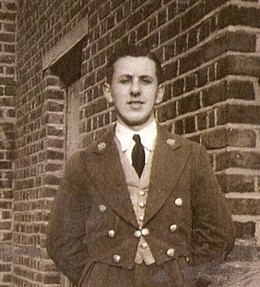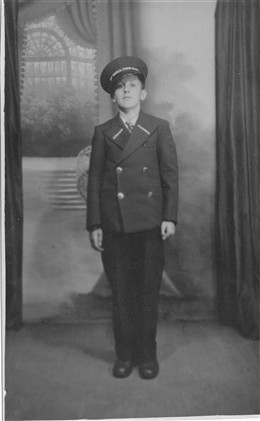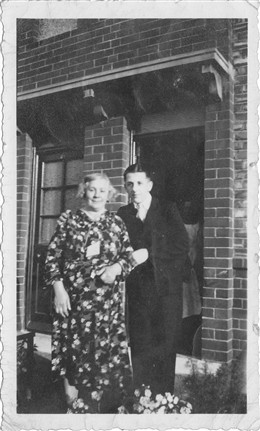John Lubin

John Lubin, Alexandra Hotel, Knightsbridge staff
Copyright Mrs Anne Hawkins and Mrs Maggie Nijman

John Lubin (aged 14). Dorman Stewarts employee
Copyright Ms Jackie Hawkins

John Lubin and his mother (Mam)
Copyright Ms Jackie Hawkins
Alexandra Hotel, Knightsbridge
By Anne Hawkins
John Lubin (15.1.1923 – 11.5.1941)
“John was a lovely boy, very kind, considerate and caring. When John left school at fourteen years old he worked for two years as an errand boy in the Middlesbrough branch of the raincoat shop chain Dorman Stewarts (advertising slogan: “We Shall Have Rain”). At sixteen the shop could not keep him on and as there were no other jobs to be had, except casual labouring at Dorman Long’s, John did not want to do this. Through an Agency, John got a job in a Gentlemens’ Club in London as a General Help. After about a year he decided to change as the wage was poor and John heard hotel work was better; so he got employed as a Lift Attendant in the Alexandra Hotel, Knightsbridge. The hotel wage was not much better than the Club but John got tips by doing jobs for the guests.
When war broke out the young male staff either volunteered or were conscripted for the war and John, still under eighteen years, was promoted to Porter. When John became eighteen in January he knew he would be conscripted and was going to register to join the RAF. Until then he worked in the hotel and volunteered to do ‘roof spotting’. This was getting on to the roof of the hotel when an air raid warning was sounded, listen out for the distinct drone of the German planes and if they were coming in the direction of the hotel to give a warning for all guests and staff to go down to the shelters. Unfortunately on the night of the 10-11 May 1941 something may have happened as John did not get down quick enough and the hotel suffered a direct hit.
As I mentioned, John was caring and wrote home every week. My mother missed receiving his letter one week and I received a letter asking me to go and see him and find out if he was alright as she was rather concerned. I was working in a hotel in Epping at the time and as it happened to be my day off when I received the letter, decided to pay John a visit. I got a Green Line bus into London, then a tube to Queensway which is opposite to Hyde Park. Crossing into Hyde Park I had to walk to the other side to Kensington Gardens to reach Knightsbridge where the hotel was. The day was rather windy, I was wearing a big picture hat and a flared skirt and had trouble with both holding the hat with one hand and my skirt with the other at the same time, thinking when I see John I will give him ‘what for’ (a telling off) for me having to do this.
When I got out of Kensington Gardens the hotel was just opposite and was roped off. I could see it was just a pile of bricks and rubble and there was quite a bit of activity around it. I went across and an Air Raid Warden told me to keep clear. However, I mentioned I had come to visit my brother who worked in the hotel. I gave John’s name when the Warden asked for it, he then looked down a bit, told me to sit on a chair and then broke it to me that John had been killed in the air raid, in fact that John had been blown to pieces. I was shocked and stunned and all I could think of was that I was going to tell him off. After a while the Warden asked if I could identify John. It flashed through my mind how could I identify him if he had been blown to pieces. However, the Warden asked me to follow him and we walked to a door when he stopped, looked at his sheet then said it would not be necessary as they had found a big toe which showed a scar that the toe had been operated on and from this knew it belonged to John. The Warden asked if I would like to sit for a while longer. I said no and made my way straight back to Epping. When I walked into the hotel the landlady came to me and it was obvious that somehow she knew I had received bad news because she handed me a telegram which had been delivered to the hotel. The telegram was from your mother telling me to go to the hotel as John had been killed. I told the landlady what had happened and that I wanted to go home to be with my parents. Condolences were offered and I was told to stay away until I was ready to return.
I packed a small case, made my way to King's Cross for the night train to Darlington where I changed for the local line to Middlesbrough. There was a Blitz going on when I arrived early at King's Cross so I waited in a shelter until it was time for the train to depart. It was almost pitch black, just lights flashing from guns. I got into an empty compartment of the train and sat huddled up in a corner. A few minutes later a man came in and I made out that he was a soldier. After shedding his gear he stretched out on the seat opposite. Because of the raid the train was delayed and it was frightening because the train was swaying from one side to the other from the blast of the bombs being dropped nearby. The train eventually crawled out of the station and when it was safely out of London the soldier said ‘Thank God for that’. I was just able to say ‘yes’ and not another word was spoken between us. At York, the soldier got out of the train and after a little while came back, handed me a cup of tea, said he had to catch another train and wished me luck.
It was early when I got to Middlesbrough, and when I got home my parents were distraught, my mother red-eyed from weeping. News of John’s death had been passed around the Lithuanians and neighbours, who came during the day and days after, offering condolences and saying prayers. When Mam was asked about funeral arrangements it was terrible. Mam kept breaking down: as there was no body there could be no funeral. If there had been a funeral Mam would have been consoled in some way. Dad was also badly affected but in his own way he managed to cope. Mam arranged to get a special requiem mass said for John.
After about a week Mam said it would be better for me to return to work, which I did.
When Dad died in 1945, Mam got a memorial stone for him and under Dad’s name Mam paid also for John’s name to be engraved in remembrance of John being killed. Doing this helped Mam a lot to come to terms at losing her youngest child.
I was close to John and over the years remembered him. It was when Jackie (Anne's daughter and John's niece) started tracing our Lithuanian ancestors that I gave a lot of thought to John. No one in the family had given a thought to make enquiries as to what had happened to John’s body or his remains, so I asked Jackie if she could find out on the internet. Information was given of people and authorities to contact so Jackie got the memorial sheet and a death certificate which states ‘a body had been found’. I still feel confused as the Air Raid Warden told me straight out John had been blown to pieces and then he said it wasn’t necessary for me to identify John. Was this because there was nothing to identify? If there was a body wouldn’t this have been sent home for a funeral to take place?
With further investigation, Jackie was informed John was buried in a London cemetery and no further information will be released until 25 years time. Just seems strange to me.
Regarding the big toe belonging to John, I remember John was in hospital somewhere outside of London where I went to visit him. The operation was for an ingrown toenail and it must have been bad because he was kept in hospital for a week".
Testimony in a letter written by Mrs Anne Hawkins (sister of John Lubin) to Mrs Maggie Nijman (John's niece). Transcription courtesy of Maggie Nijman; additional information from Jackie Hawkins (Anne's daughter and John's niece). John Lubin is listed on the Main Civilian War Memorial in Hanwell Cemetery (City of Westminster Registration District), Ealing. For details of the events at the Alexandra Hotel on the night of 10-11 May 1941, see Bomb Incidents page.